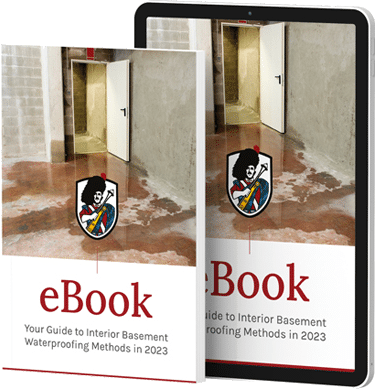One of the worst things to happen to your basement is a leak. A leak can potentially cause more serious problems or highlight underlying issues, which can lead to a snowball effect of necessary repairs. If you have a wet basement, it is important to follow these vital steps and precautions in order to prevent mold and other potentially costly issues.
Water in your Basement?
A wet or damp basement can prove to be an expensive nuisance—especially if your basement has a furnished living space. Any form of moisture is capable of damaging your carpeting, drywall, framing, and more. Even if your basement only includes a crawl space or is used for storage, condensation can cause the hardwood to buckle on the floor above, joists to sag or spawn harmful mold.
What Causes a Wet Basement?
Water damage to your basement is most likely caused by excessive rainfall, incorrect grade, broken eavestroughs or melting snow. Even a minor storm is more than capable of causing a wet or leaking basement. In more extreme cases, the problem is rising groundwater. Once the water begins to accumulate and surround your foundation, it can enter your home through cracks, joints, and other porous materials.
How Much Does it Cost to Waterproof a Basement?
The cost to waterproof your home varies from house to house. We offer free estimates and consultations in order to provide you with a quote regarding your project. Unfortunately, it’s extremely difficult to provide an accurate estimate until the situation has been analyzed onsite by one of our foundation specialists. Usually, the three issues that can lead to a wet or leaking basement are condensation, runoff, or subsurface seepage surrounding your foundation.
Condensation
Also referred to as “sweating,” condensation presents itself as water droplets, wet spots, or puddles on your basement floors and walls. Condensation occurs when moist, warm air interacts with cool foundation walls or uninsulated water pipes—resulting in damp/wet carpeting, rusting appliances, and causing your basement to become an unpleasant area. Within crawl spaces, condensation encourages wood to rot, attracts insects, and can cause plywood to buckle as well.
Runoff
Rainfall or melted snow that isn’t directed away from your home’s foundation is one of the most common causes of basement and crawl space moisture. Runoff can enter your home through porous soil which is then forced through any cracks in your foundation by hydrostatic pressure. Water/moisture is also capable of moving through foundation cracks by capillary action.
Do you have a Runoff Problem?
A damp crawl space or wet basement walls and/or floors immediately following a storm or as snow melts are obvious signs the problem is caused by runoff. When determining whether runoff is an issue, it is important to look for ways runoff can potentially enter your basement or crawl space. The first step is to ensure that the ground outside your home slopes away from the foundation and check that all driveway curbs are channeling runoff to the street. You will also want to check for cracks on your driveway surface which can allow water to collect and pool below grade.
Subsurface Seepage
If you noticed your wet basement symptoms act like runoff but occur constantly, it’s likely you are dealing with high groundwater.
Does Your Home Have a Below-Grade Issue?
Unless your home’s foundation is surrounded by soil with an extremely high clay content—which is capable of absorbing rainwater and snowmelt for an extended period of time—runoff problems usually disappear as the water begins to drain. However, if your basement is constantly wet following a storm or if water is coming through your basement floor, flowing through your walls or building up where the walls meet the floor, it’s likely your home has an underlying subsurface problem that should be examined immediately in order to prevent any serious problems within your basement or crawl space. It’s difficult to determine the issue if you can’t see the problem, especially if the issue is occurring below your home or up against the foundation. In order to determine the exact issue, a foundation specialist is required to analyze the situation and determine the cause at hand.
With winter being well underway, it’s vital to constantly monitor your basement, crawl space, and foundation to ensure your home isn’t susceptible to a potential leak. It’s important to take preventative measures and monitor for the above issues to ensure you don’t experience a flooded or leaky basement. Review the above issues and thoroughly examine your basement and foundation. If you suspect any damage to your home or foundation, contact our specialists to learn how we can keep your home secure and dry—especially during the winter months.
For more information please visit our website, follow us on Facebook, or call us at 905-824-2557.







